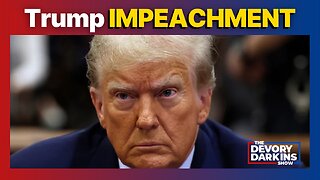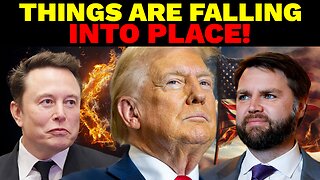Premium Only Content

The Truth about First-Time ISF Violations: No Grace Period!
US Customs Clearing | 213-270-1930 | info@uscustomsclearing.com | https://uscustomsclearing.com/
Welcome to another episode of our customs brokerage series. In today's discussion, we will be exploring the topic of customs duties and tariffs and the implications they have on international trade.
Customs duties and tariffs are taxes imposed by the government on goods that are imported or exported. These taxes are designed to protect domestic industries, regulate trade, or generate revenue for the government.
When it comes to customs brokerage, it is essential to understand how customs duties and tariffs work, as they directly impact the cost and profitability of international trade transactions. Customs brokers play a crucial role in helping importers and exporters navigate the complex landscape of duties and tariffs by providing expertise and advice on the applicable rates and regulations.
One important concept to understand is the Harmonized System (HS) code. The HS code is an internationally recognized system for classifying products traded internationally. Each product is assigned a unique code that determines the applicable customs duties and tariffs. Customs brokers are well-versed in identifying the correct HS code for a product, ensuring that the correct duties and tariffs are applied.
It is also worth noting that customs duties and tariffs can vary significantly from country to country. Free trade agreements and preferential trade arrangements can lower or eliminate tariffs on certain goods traded between specific countries. Customs brokers have in-depth knowledge of these agreements and can help importers and exporters take advantage of the benefits they offer.
Additionally, customs brokers are responsible for ensuring that the correct customs valuation methods are used to determine the value of imported goods. The customs value is a crucial factor in calculating the applicable customs duties and tariffs. Customs brokers utilize their expertise to accurately assess the value and avoid any discrepancies or under/overvaluation issues.
In conclusion, customs duties and tariffs play a significant role in international trade, and understanding their implications is vital for customs brokerage professionals. Customs brokers are well-equipped to navigate the complexities of customs duties and tariffs, ensuring compliance with regulations and optimizing trade transactions. By leveraging the expertise of a licensed customs broker, importers and exporters can streamline their operations, reduce costs, and enhance their competitiveness in the global market.
#usimportbond #isfcustomsbroker #uscustomsclearing #isfentry
Video Disclaimer Here: For learning purposes only, We claim no affiliation with any US government agency.
0:50 - No grace period for first-time ISF violations; penalties apply regardless of prior offenses.
1:05 - Possible penalties include monetary fines, delays in goods release, and seizure of cargo.
1:26 - ISF is linked to customs bonds, which ensure compliance with customs laws and ISF requirements.
-
 1:43:11
1:43:11
Omar Elattar
1 month agoFrom Bank Robber To Millionaire: How I Became A $100M Sales Trainer
203 -
 2:42:28
2:42:28
FreshandFit
9 hours agoShe Dated Him For 2 YEARS Before Finding THIS OUT?!
95.2K105 -
 2:41:49
2:41:49
Laura Loomer
10 hours agoEP99: Trump Dumps USAID As Leftists Panic!
93K41 -
 22:50
22:50
DeVory Darkins
15 hours ago $16.52 earnedDemocrats UNLEASH IMPEACHMENT on Trump
53.8K230 -
 1:17:34
1:17:34
Mike Rowe
12 hours agoA Masterclass In The Collapse Of Woke Culture With Anson Frericks
59.6K39 -
 17:51
17:51
Stephen Gardner
11 hours ago🔥YES!! Trump CUTS CORD on Democrats SECRET PROGRAM!
85.2K67 -
 2:16:49
2:16:49
TheSaltyCracker
11 hours agoMusk Destroys Gov't Money Pot ReeEEeE Stream 02-05-25
159K273 -
 1:10:59
1:10:59
FreshandFit
11 hours agoTop 3 Ways To Overcome A Break Up
122K16 -
 6:32:11
6:32:11
Akademiks
12 hours agoDrake Finally CUTS off FAKE FRIENDS in the Industry. VIOLATES KHALED, LEBRON! Announces album Feb14
95.6K12 -
 27:28
27:28
Glenn Greenwald
16 hours agoGlenn Reacts to Trump's Gaza Take Over: System Update Special
198K449